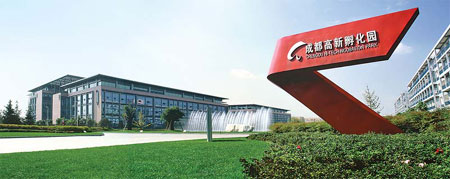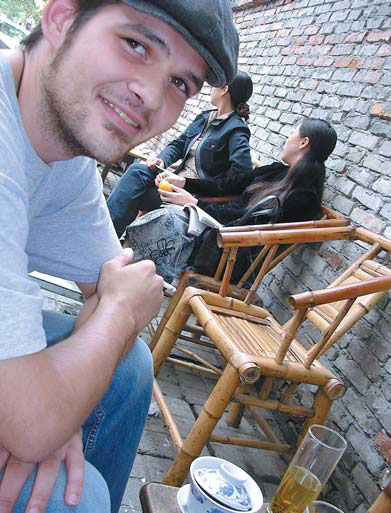Big city attracts expats with small-town feel
Updated: 2013-01-09 08:05
By Deng Zhangyu (China Daily)
|
||||||||

|
Chengdu's biggest community to accommodate expatriates is located in the city's high-tech development zone. Photos Provided to China Daily |
|
Pandas are a great tourist attraction in Chengdu. |
|
Sascha Matuszak relaxes at teatime in a small alley in Chengdu. |
Walking around Chengdu, a big city in southwestern China, tends to make people feel about the same as they would in Beijing, Shanghai or other big cities.
Yet, lying beneath the modern face of the city is "a small-town feeling", said Andrew Barnett, a restaurant manager at the Chengdu branch of the Bookworm bookshop, where he has worked for several months.
"It's a big city with a small- town feeling, very comfortable and hospitable," said the 39-year-old.
The Korean-American restaurant manager has lived in several big cities, including Boston and New York City. Barnett stayed briefly in Hong Kong and Shanghai last year before moving to Chengdu.
"I love big cities," he said. "Chengdu is just another big city where I don't speak the language."
Barnett is among the increasing number of expatriates who are moving to Chengdu amid the city's quickening modernization.
More than 14,000 expatriates from 125 countries and regions now either work or study in the city, and the number keeps increasing, according to the 2012 Chengdu Investment Guide.
Barnett said living in Chengdu is like jogging, and living in Shanghai is like running. He said that doesn't mean the pace of life is slower in the southwestern city, only that people's attitudes in both places differ. In other words, he explained, Chengdu residents are more relaxed.
Sascha Matuszak, a German-American who came to Chengdu 10 years ago to work as a freelance writer, had similar thoughts.
"People always say life in Chengdu is slow," he said. "It's not slow. Things are happening very quickly - metros, skyscrapers and airports. But people here are cool about it."
He said Shanghai and Beijing residents find the fast pace of those cities to be stressful. Chengdu residents, in contrast, find respite from those pressures in the city's food and tea, Matuszak said.
Chengdu, the capital city of Sichuan province, is home to many famous dishes, including mapo tofu and kung pao chicken.
Barnett said dining in New York is a serious ritual.
"But in Chengdu, people care more about food and taste," he said.
Barnett has worked in the food industry for more than 20 years.
He said diners in New York City are serious about matters such as the way a plate comes out, when it comes out and how it's served. People in Chengdu, in contrast, care only about one thing - taste.
Matuszak agreed.
"If chefs can't provide authentic, twice-cooked spicy pork (a traditional Sichuan cuisine), nobody will visit their restaurants in Chengdu," he said in the local dialect.
Chengdu residents tend to be fond of restaurants that are hidden in alleys and street corners and only have room for a few tables.
"If the chefs (at these places) aren't in a good mood, they'll just close their restaurants for a day or two," he said. "They're serious about their food."
Apart from Sichuan cuisine, people can find relaxation in the teahouses dotting nearly every corner of the city. In many ways, the teahouse is to Chengdu what the bar is to London and the cafe is to Paris.
Both Barnett and Matuszak go to teahouses in the city - often to meet friends. They said a cup of tea can cost them anything from less than a dollar to more than 10 dollars, depending on where they buy it.
"Everyone here has a teacup," said Matuszak, who is married to a Chengdu woman and has two sons. "People drink tea while they're working."
Matuszak first arrived in Chengdu in 2002 and left and returned several times over the following years. In 2011, he spent an entire year in Shanghai in search of better pay. In the end, though, he decided to settle in Chengdu, where he began his Chinese journey.
"Chengdu has a little bit of everything," he said. "It has the culture of Beijing, but isn't as big. It has the business and jobs that Shanghai has, but isn't as stressful as Shanghai."
In the past few years, renowned organizations and economists have bestowed various honorary titles on Chengdu. The World Bank, for instance, has deemed it "a benchmark city for investment environment in inland China" and economists have called it the "engine" of the western development, a government initiative.
The city is also renowned for its manufacturing. Two-third of the world's iPads are made in Chengdu, and the city's production capacity of computers reaches one-fifth of the world's total.
The Chengdu Investment Presentation and Project Signing Ceremony, which was held in Beijing, Shanghai and Shenzhen this month, was the occasion for pledges to invest 42.253 billion yuan ($6.79 billion) into the city.
Speaking at the ceremony, Mayor Ge Honglin said Chengdu is poised to become the engine of the development of the country's western region, especially as domestic and foreign companies spend more in the city.
With such fast growth, Chengdu is almost certain to continue attracting foreigners, more and more of whom are taking to running businesses and restaurants.
To better accommodate expatriates, the Chengdu government has built up several international communities. The biggest one is in its high-tech development zone, where it has apartments, schools, hospitals, shopping malls and a community church to accommodate 5,000 people.
"Chengdu, with its comfortable living conditions, is ready to welcome more expatriates," said Tang Jiqiang, spokesman for the Chengdu Hi-Tech Development Zone.
"As I stay in Chengdu longer and longer, I feel more and more comfortable," Barnett said. "Like a nice pair of shoes, you never want to take them off."
Matuszak said he sees many of the same advantages.
"Right now, living here is not a problem," he said. "Many of my friends think Yunnan province is the best place to travel. But for living, they come here."
dengzhangyu@chinadaily.com.cn
(China Daily 01/09/2013 page7)

 In Photos: 7.0-magnitude quake hits Sichuan
In Photos: 7.0-magnitude quake hits Sichuan
 Li Na on Time cover, makes influential 100 list
Li Na on Time cover, makes influential 100 list
 FBI releases photos of 2 Boston bombings suspects
FBI releases photos of 2 Boston bombings suspects
 World's wackiest hairstyles
World's wackiest hairstyles
 Sandstorms strike Northwest China
Sandstorms strike Northwest China
 Never-seen photos of Madonna on display
Never-seen photos of Madonna on display
 H7N9 outbreak linked to waterfowl migration
H7N9 outbreak linked to waterfowl migration
 Dozens feared dead in Texas plant blast
Dozens feared dead in Texas plant blast
Most Viewed
Editor's Picks

|

|

|

|

|

|
Today's Top News
Live report: 7.0-magnitude quake hits Sichuan, heavy casualties feared
Boston suspect cornered on boat
Cross-talk artist helps to spread the word
'Green' awareness levels drop in Beijing
Palace Museum spruces up
First couple on Time's list of most influential
H7N9 flu transmission studied
Trading channels 'need to broaden'
US Weekly

|

|










